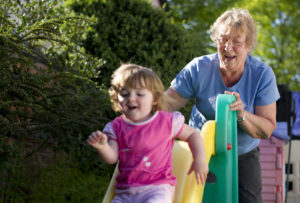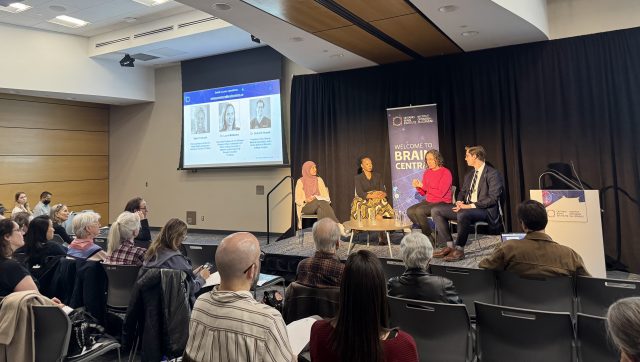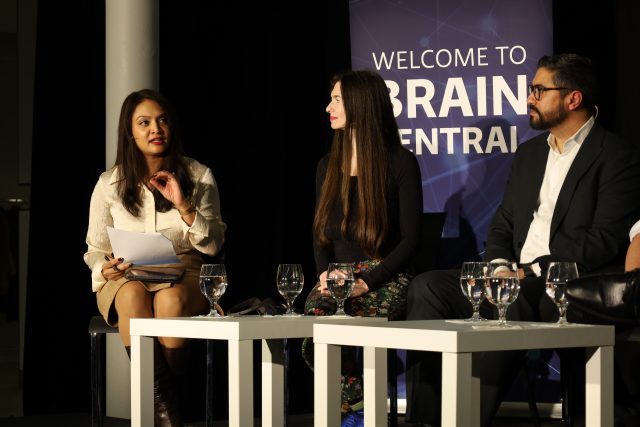
Caring for Those Living with Dementia, Stroke and Neurodegenerative Diseases
By now you have heard a lot about the COVID-19 virus and its impact in Canada and around the world, including some mandatory self-isolation in parts of Europe and elsewhere. While trying to maintain a safe distance from others during this time is a good idea, we cannot forget about those who are the most vulnerable, including people living with dementia, stroke or neurodegenerative diseases.
Neurodegenerative diseases are conditions of the brain and/or spinal cord, where a progressive loss of brain cells causes problems with memory, thinking and/or movement. When memory and thinking problems are severe enough to make the person dependent on others, this is called dementia. The most common causes of dementia are Alzheimer’s disease, stroke or vascular cognitive impairment; Parkinson’s disease; frontotemporal dementia, and amyotrophic lateral sclerosis or ALS.
Coronavirus is a particular threat to this population for several reasons. First, these conditions are much more common with age and COVID-19 seems to be more severe for older people, particularly those over 80. Second, COVID-19 has a greater impact on those with other chronic conditions like diabetes, stroke and dementia. Third, the strategies used to “flatten the curve” and limit spread (handwashing, social distancing, limiting in person visiting) are especially difficult for someone with memory, planning or movement problems. Finally, those living with dementia, stroke or other chronic conditions may be especially challenged during this time as they are often dependent on others to help with their daily needs like buying groceries, preparing meals and bathing, so care partners may find it difficult to manage their loved ones’ needs while staying healthy and keeping a social distance themselves.
During the current pandemic, many regions are reducing elective surgeries and clinic services, so resources are available to manage the COVID-19 outbreak. This is an unprecedented challenge to our society and health care system; but there are some easy things we can do to ensure the health and well-being of some of the most vulnerable members of our society – those living with dementia, stroke and neurodegenerative diseases.
Examples include:
- Use technology. Many hospitals and primary care organizations may limit in-person access, but options for telephone calls and/or computer visits are quickly being established. Doctors are being asked to provide more care through phone calls and video technology but we must ensure patients can benefit from this. Where possible, people are making efforts to ensure vulnerable populations have access to technology (like iPads) for ‘virtual visits’, and that they understand how to use it. Caregivers and families can help to ensure vulnerable elderly have devices and good access to the internet to connect to care providers and potentially avoid hospitals or offices, without sacrificing care. Similarly, family and friends may also have to limit in-person contact but could be more available for phone or video visits. Where available, online ordering for food or medication may make it easier to avoid long lines.
- Make sure you have enough, but don’t stockpile medications. We all need to ensure we have a sufficient supply of medications to reduce the need to make trips to the pharmacy. Many pharmacies will also deliver, so those at increased risk may wish to consider this as an alternative. However, according to the Canadian Pharmacists Association “unnecessary stockpiling of medication can create unintended shortages and puts other patients’ health at risk.”
- Know your resources and seek support. Familiarize yourself with support agencies in your community and how to reach them. Many organizations, including Heart & Stroke, the Alzheimer Society, ALS Society, Parkinson’s Canada, MINT Memory Clinics, Regional Geriatric Programs (all website references below) have advice for managing at these times. For people living with, or caring for someone with dementia, Alzheimer Societies across the country offer a host of programs and services and will modify support accordingly to ensure continued care. 211 Ontario can also connect people to the right information and services and can be accessed by dialing 211 on any phone. Check with your local organization chapters for details.
- Be a good neighbour. If you know someone in your community who may be vulnerable, such as those living with a neurodegenerative disease or stroke, check in on them by phone, by email, or in person if possible. Make sure they have what they need in this time of social distancing. Check in on care partners to ensure they have enough support.
Your thoughtful acts will be greatly appreciated. Together our communities can help to ensure that social distancing does not result in social isolation. For additional information on the COVID virus, please click on the helpful links below:
- Community-based measures to mitigate the spread of coronavirus disease (COVID-19) in Canada
- Ontario Enhancing COVID-19 Protections for Long-Term Care Residents, Families and Staff
This message is brought to you by the following community partners:
Ontario Neurodegenerative Diseases Research Initiative (ONDRI) is a unique collaboration funded by the Government of Ontario through the Ontario Brain Institute, that brings together clinicians, researchers, community groups and persons with lived experience to advance research and care across neurodegenerative diseases. As part of this collaboration, ONDRI is developing wearable sensors to help improve independence, facilitate diagnoses, guide targeted treatments and enhance quality of life for persons with NDD and their families.
Ontario Brain Institute is a not-for-profit organization that accelerates discovery and innovation, benefiting both patients and the economy. Our collaborative ‘team science’ approach promotes brain research, commercialization and care by connecting researchers, clinicians, industry, patients, and their advocates to improve the lives of those living with brain disorders. Funding provided, in part by, the Government of Ontario.
Alzheimer Society is Canada’s leading nationwide health charity for people living with Alzheimer’s disease and other dementias. Active in communities across Canada, the Society provides information, programs and services, and raises funds for research to better understand the causes of dementia, improve treatment and care, and to find cures.
About Heart & Stroke. Life. We don’t want you to miss it. That’s why Heart & Stroke leads the fight against heart disease and stroke. We must generate the next medical breakthroughs, so Canadians don’t miss out on precious moments. Together, we are working to prevent disease, save lives and promote recovery through research, health promotion and public policy.
Parkinson Canada is the national voice of Canadians living with Parkinson’s.
The ALS Society of Canada works with the ALS community to improve the lives of people affected by ALS through support, advocacy and investment in research or a future without ALS.
Regional Geriatric Programs of Ontario is a network of specialized geriatric clinical services focusing on the needs of older adults living with complex health concerns, including dementia, mental health and substance use concerns, and frailty.
MINT Memory Clinics are a new, easy-to-access model of dementia care within family doctors’ offices, offering persons living with dementia and their families compassionate, complete care that’s close to home


